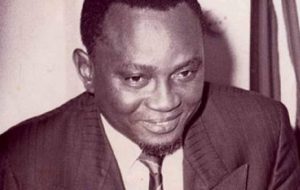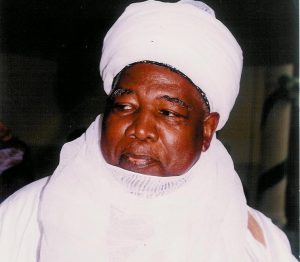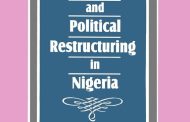The late Dr. Stanley Macebuh’s tribute to the equally late Dr. Ibrahim Tahir which serves as the cover picture of this piece raises a question: what explains the perpetual conflict, most often violent, between Christians and Muslim when that conflict is almost always between the urban poor on both sides and rarely ever between the petty bourgeoisie or the rural folks on both sides?

The late Dr. Stanley Macebuh, literary philosopher and pioneer MD of the Lagos based Guardian newspapers
Some readers will reframe the above question more beautifully or even interrogate it but only few can afford to dismiss it on factual grounds. Reading Macebuh’s summary of his interaction with Tahir, one can see they had their own differences in terms of points of departure but they could frame such in a high level of abstraction that strengthened the bond between them rather than become a point of conflict. It would not be correct to attribute that to their high level of education – Macebuh from Columbia University in the US and Tahir from Cambridge University in the UK. It wouldn’t because the rural folks – Igbos, Yorubas and Fulanis – that some of us encountered in some of the remotest parts of Jigawa State some years ago also have their own idioms of co-existence.
It might not have been friction free interaction but rarely do the reports that came to Government House talk about inter-cultural friction. It was always more about someone preaching in a way that could lead to a breach of law and order among Muslims and all such were nipped in the bud.

The late Dr. Ibrahim Tahir, Cambridge educated Sociologist
If the sort of claims that could lead to extreme violence hardly occur among the rural folks and among the upper echelon, what is it that makes the urban poor vulnerable to violent instincts without any concessions to the humanity of the Other?
This question is worth pondering upon further, much, much beyond Macebuh and Ibrahim Tahir. At Bayero University, Kano and notwithstanding the generational and status gap between most of the students and the lecturers, it was a repeat of Macebuh and Tahir. This might not have been the experience of the majority but the few who had it can never forget Prof Dahiru Yahya and Prof Ahmadu Jalingo, for examples. Across the campuses in Nigeria, this was also the case – quality grooming through informal sessions with certain lecturers who had simply acquired certain standing on campus or even in the larger society and who understand their responsibility as such as to go beyond propaganda in explaining things.
Moving further, it is inconceivable that the Sultan of Sokoto and the Obi of Onitsha would be slugging a blasphemy claim against each other. The incumbent Obi of Onitsha went to Stanford University in California while the incumbent Sultan was a Brigadier-General and a diplomat.
So, there is a gap to be explained. Why do we call these violent creases religious even when those who know what the religion says are rarely found in combat over one claim or another? This is an applied version of what former Foreign Affairs Minister, Sule Lamido, used to say about what are generally called ethnic conflicts in Nigeria. If those conflicts are actually ethnic conflicts, he would ask, why is it not the traditional rulers who symbolise ethnic leadership leading the street combats?
The same question here would be: why is it not the Catholic Bishop of Sokoto in a hot argument with the Sultan over what constitutes blasphemy in Islam? Instead of the two quarrelling, it is some students that are acting the accusers, prosecutors, judges and executioners and gloating about it.
Is this gap there because the youth wings of the existing political parties are no youth wings at all? Is it the rise of identity politics in the post Cold War? Is it another manifestation of state collapse in Nigeria? Is it Bala Usman’s theory of manipulation of religion in Nigeria? Is it the social media and the age of images? Or is it something that we just don’t know anything about even as one such violent crease could throw a nation off balance?
Who or what is going to arise and close this gap, with what means and how soon? A ‘Third World’ country where the majority is roasting in poverty just cannot afford adding the kind of unproductive conflicts which are enveloping Nigeria by the day. In all cases, it is the masses and the urban poor that suffer most!





























1 Comments
Abdullah Musa
We are inclined to approach human conduct on the basis of rationality.
Reality shows that humans are mostly irrational. Many have the inordinate desire to dominate others. US, EU are in Ukraine in order to contain Russia if it insists in not accepting a junior status.
Politicians in Nigeria are in cohort with religious leaders in order to dominate their adversaries.
Deborah would have expected to be garlanded by the leaders of her faith for abusing the icon of an opposing religion.
So far this approach to life has been yielding dividends such that practitioners would not stop.
To the majority, there cannot be a higher purpose than their tribal or religious prejudices.